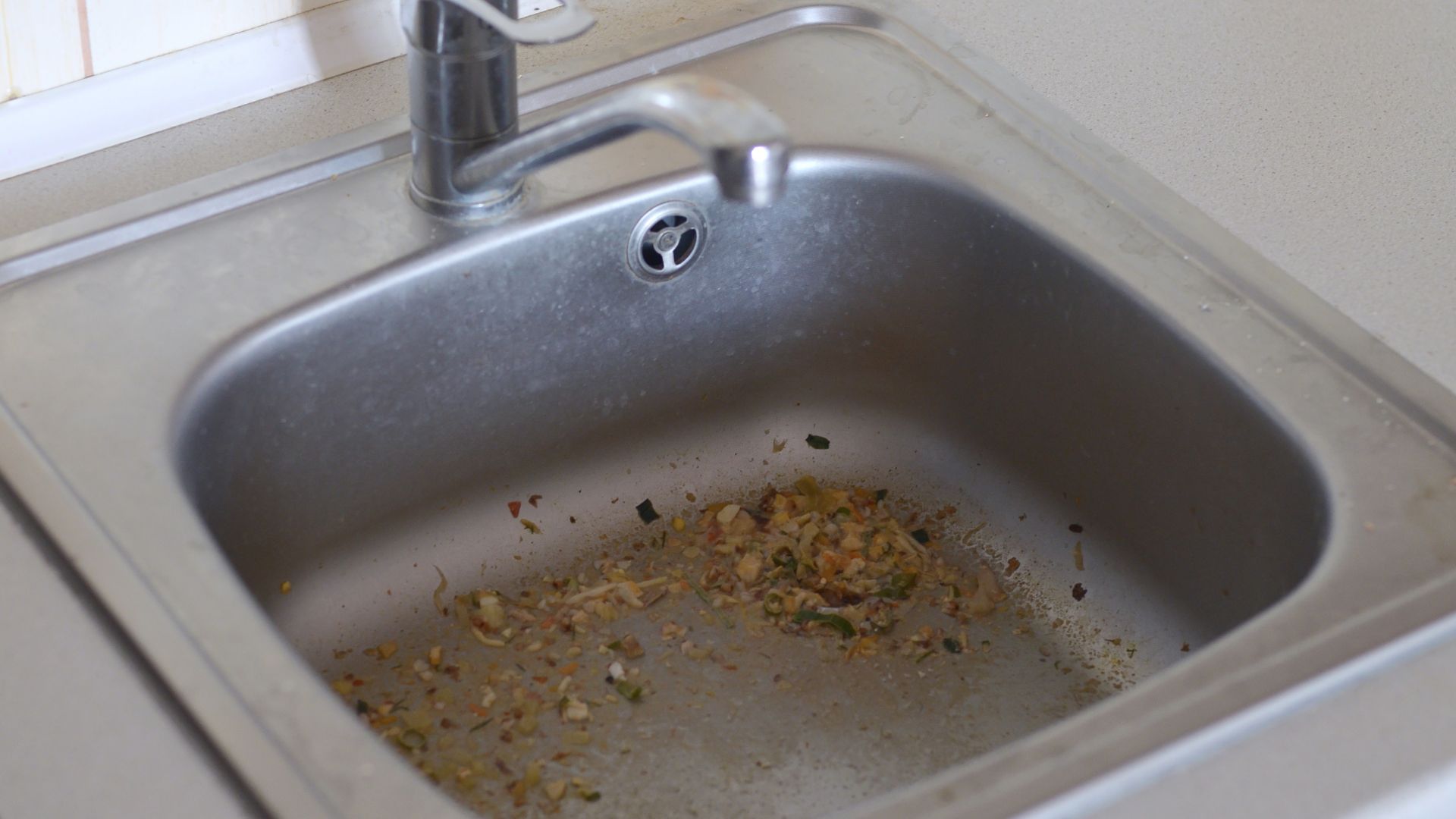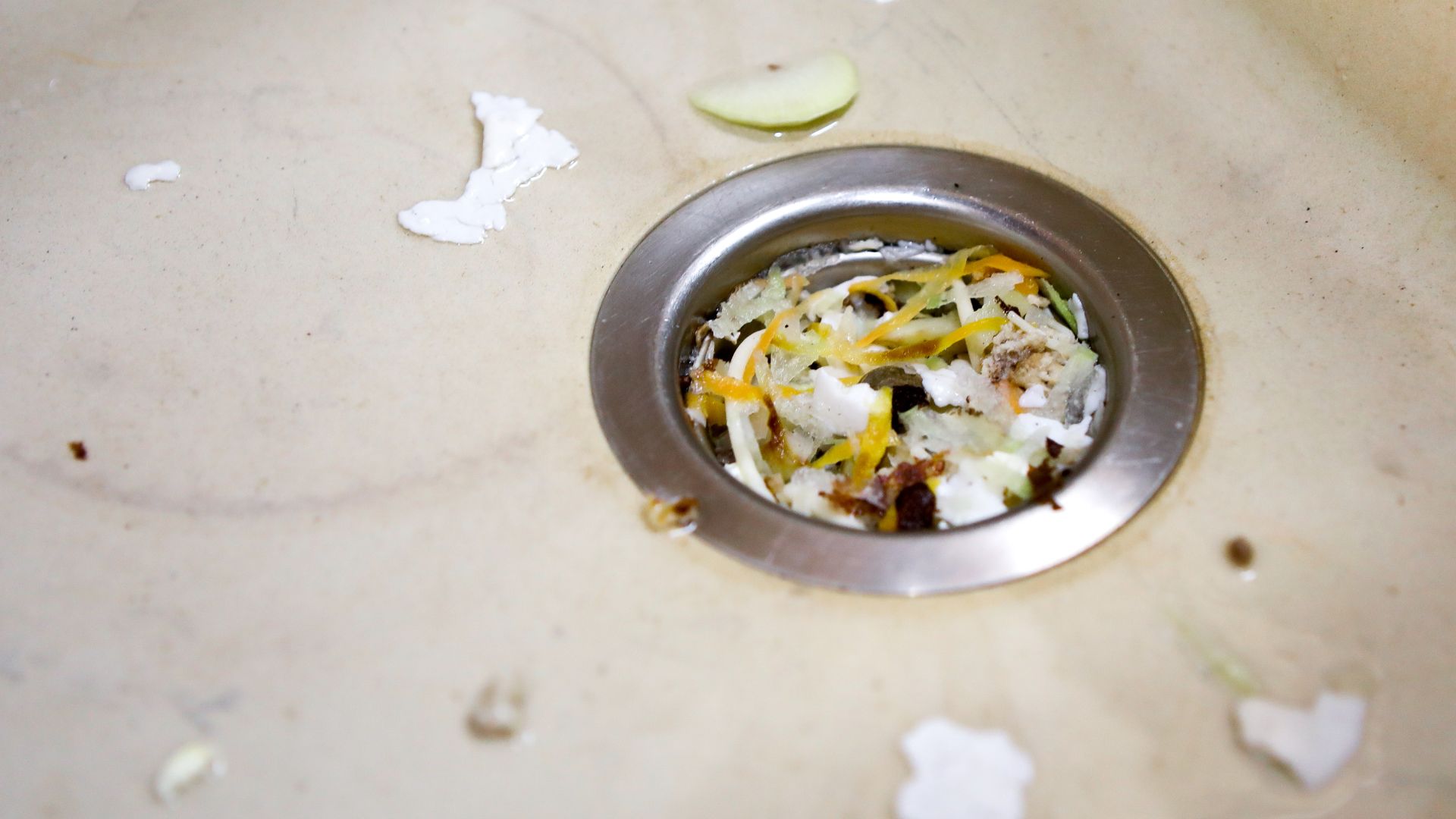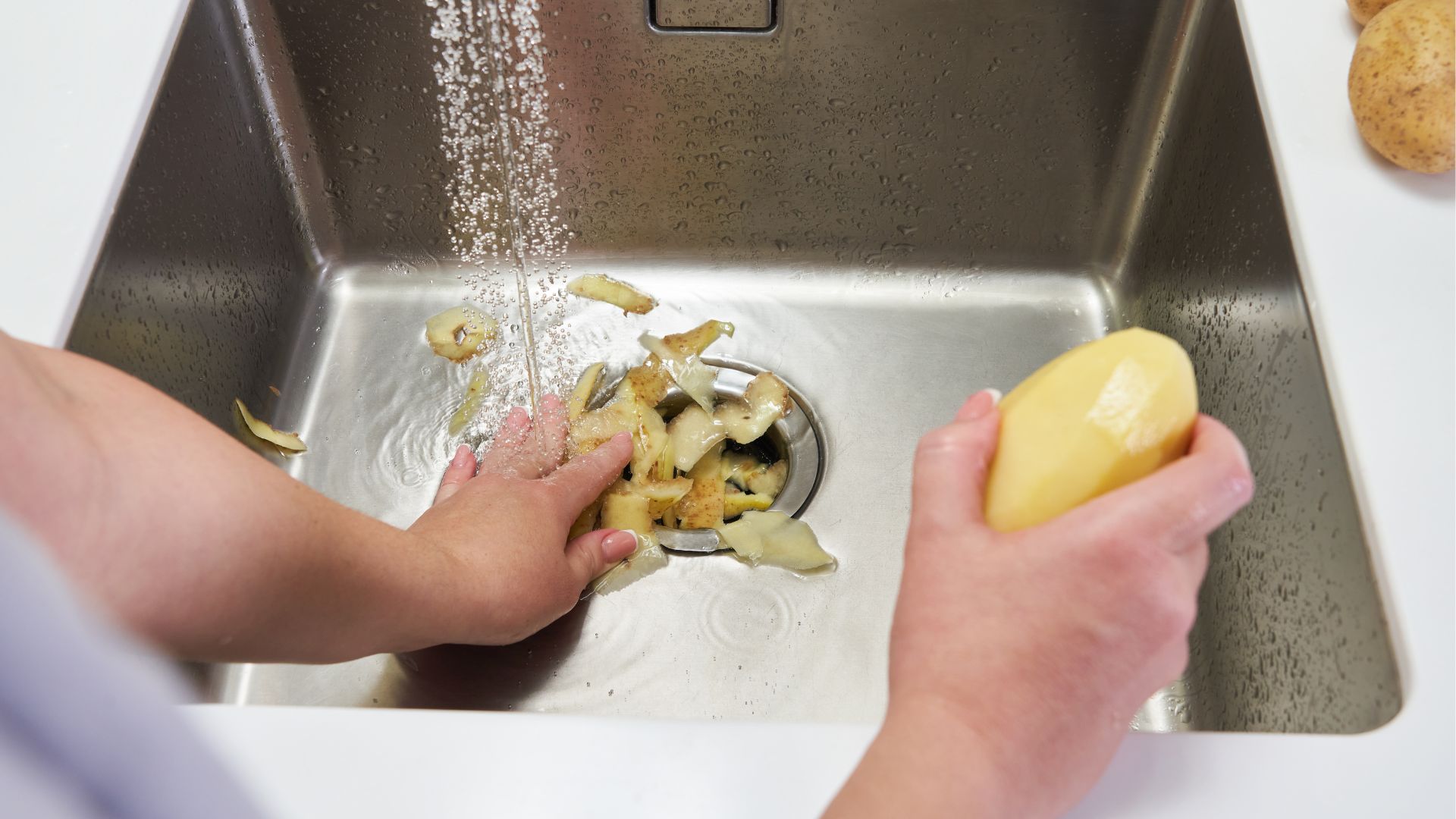Many households encounter ongoing frustrations when their sinks get clogged, disrupting daily routines. Improper disposal of things like greasy pans or stray food scraps can lead to significant plumbing headaches if not addressed.
A blocked kitchen drain can lead to inconvenience, unpleasant odours, and potential health risks. Have you noticed your kitchen sink draining longer or producing an unpleasant smell? It’s a common sign that food particles have built up in the pipes.
This guide will equip you with practical solutions to tackle food particle build-up in your kitchen sink and prevent further blockages, ensuring your kitchen remains clean and fully functional.
Common Causes of Food Particles Blocking Kitchen Sinks
Food particles are a frequent culprit in blocked kitchen sinks. Understanding the causes can help prevent this common household issue.
Grease and Fat Residues
Grease and fat are notorious for their ability to solidify inside pipes. When hot, they seem harmless, but as they cool, they harden, creating sticky surfaces that trap food particles. Over time, this build-up can lead to significant blockages.
Leftover Food Scraps
Leftover food scraps are another major issue. Many folks rinse these right down the sink without using methods like a filter. These scraps can pile up in the pipes, mixing with grease and other debris to create stubborn clogs.
Inadequate Drainage System
An inefficient or outdated drainage system can worsen the problem. Older systems may not handle waste effectively, allowing more debris to collect and cause blockages. Regular maintenance and upgrades are essential to ensure smooth drainage and to prevent persistent clogs.

Consequences of Ignoring Food Particles in Kitchen Drains
Neglecting food particles in kitchen drains can lead to severe issues that are best avoided through regular maintenance and care.
Pipe Blockages
When food particles are ignored, they accumulate, causing significant blockages. Over time, these blockages can lead to major plumbing problems, requiring costly repairs and potentially disrupting daily life.
Foul Odours
Trapped decomposing food particles in pipes can lead to unpleasant smells. These odours can spread through the kitchen, making it uncomfortable and signalling a build-up that needs prompt attention.
Health Hazards
Stagnant food particles can breed bacteria, posing serious health risks. Harmful bacteria can spread and affect kitchen hygiene, potentially leading to illness.
Preventative Tips for Managing Food Particles in the Sink
Managing food particles effectively can prevent blockages and maintain a healthy kitchen environment. Here are some practical tips:
- Proper waste disposal is essential. Use a strainer to catch solid food debris before it reaches the drain, and empty it regularly to ensure its effective operation.
- Another crucial step is scraping food before washing. Thoroughly scrape plates and pans into the bin before rinsing them. This reduces the amount of food waste entering the drainage system and helps prevent clogs.
- Avoid pouring grease down the drain to prevent grease from hardening inside pipes. Instead, cook’s fats and oils should be collected in a container and disposed of in the rubbish bin. This simple habit can significantly reduce the risk of blockages.
- Regular drain maintenance is also essential. Flush drains with hot water regularly to help keep food particles from building up. Periodically using a natural drain cleaner can also maintain clear pipes and ensure efficient drainage.
DIY Solutions to Clear Food Particles from Your Drain
Clearing minor blockages in your sink can often be handled with simple DIY methods. Here are some practical solutions:
Boiling Water Flush
Using boiling water is a straightforward way to dissolve stubborn particles, particularly grease. Carefully pour a kettle of boiling water directly down the drain. This method helps melt and wash away fatty deposits that may have solidified inside the pipes.
Baking Soda and Vinegar
The classic mix of baking soda and vinegar can effectively break up blockages. Pour half a cup of baking soda down the drain, followed by half a cup of vinegar. Let it fizz for about 15 minutes, then flush with hot water to clear away any remaining debris.
Plunger Technique
A sink plunger can effectively remove more challenging blockages. Ensure there’s enough water in the sink to cover the plunger’s cup, creating a seal. Pump the plunger vigorously several times to dislodge the blockage, then check if the water drains away smoothly.
Natural Remedies vs. Chemical Drain Cleaners
Choosing the proper method to clear blocked drains involves weighing the benefits and drawbacks of natural and chemical options. Each approach offers unique advantages and challenges, making it essential to consider environmental impact, safety, and effectiveness when deciding how to address plumbing issues.
Natural Remedies
Natural drain cleaners like salt, baking soda, and vinegar are favoured for their minimal environmental impact. These ingredients work to break down organic matter, clear blockages, and freshen drains without introducing harmful chemicals into the water supply. While natural solutions are safer for the environment and less likely to damage pipes, their effectiveness can be limited, particularly with severe clogs.
Chemical Cleaners
Chemical drain cleaners are often more effective in quickly dissolving stubborn blockages. These cleaners use powerful chemicals to break down grease, hair, and other obstructions. However, they pose several risks, such as corroding pipes over time, damaging septic systems, and harming the environment. Direct exposure can also lead to health hazards, making them a less safe option for regular household use.
Comparative Analysis
Natural remedies are safer for pipes and the environment, although they may require repeated applications and patience for tough clogs. While highly effective, chemical drain cleaners can cause long-term damage to plumbing systems and pose safety concerns.
Ultimately, the choice depends on balancing the need for immediate effectiveness with potential risks to both health and infrastructure. Natural solutions are generally preferable for minor clogs, while chemical cleaners may be reserved for the most stubborn cases.
Signs That Indicate You Need a Professional Plumber
Knowing when to call in a professional is crucial when plumbing issues arise. Sure signs suggest that DIY solutions might not suffice, indicating the need for expert intervention. Here are key indicators that you should contact a professional plumber.

Recurring Blockages
If you experience frequent clogs despite using DIY solutions, this could indicate a more significant underlying issue. Persistent blockages might mean a deeper problem in the plumbing that requires professional inspection and repair.
Water Backing Up
Water backing up in sinks, tubs, or toilets is a sign of a severe blockage. This issue often suggests a blockage deeper in the plumbing system, which is unlikely to be resolved without professional tools and expertise.
Gurgling Sounds
Gurgling sounds from your pipes or drains often indicate improper drainage or a developing blockage. These noises are typically a sign that air is trapped in the pipes due to an obstruction, which requires a professional plumber to diagnose and fix appropriately.
Long-Term Prevention Strategies
Long-term plumbing health requires proactive measures rather than reactive fixes. Implementing these prevention strategies can minimise the risk of clogs, pipe damage, and costly emergency repairs. Below are some effective long-term methods to help keep your plumbing system functioning smoothly:
Enzyme-based Drain Cleaners
Enzyme-based drain cleaners are an effective long-term solution for maintaining clean pipes. Over time, these cleaners use natural enzymes to break down organic matter, such as grease and food particles. Unlike harsh chemical cleaners, enzyme-based products are safe for pipes, septic systems, and the environment, making them an excellent choice for ongoing drain maintenance.
Regular Professional Inspection
A proactive measure to prevent significant plumbing issues is scheduling annual inspections with a professional plumber. A professional inspection can identify early signs of blockages, pipe damage, or other potential problems before they escalate, saving time, money, and stress in the long run. Routine check-ups ensure the overall health of your plumbing system and can help avoid emergency repairs.
Install Garbage Disposal Unit
A garbage disposal unit can prevent clogs by grinding food particles into smaller, manageable pieces before they hit the plumbing. This reduces blockage risk and eases drain maintenance. It’s a handy tool in busy kitchens where food waste frequently leads to clogs, offering an effective way to keep pipes clear.
Use Drain Screens
Drain screens are a simple yet effective tool for preventing clogs. Large particles like hair, food scraps, and debris are caught by placing screens over drains before they can enter the pipes. This helps reduce the risk of blockages and makes cleaning the drains easier. Drain screens are especially useful in bathrooms and kitchens, where hair and food particles are common causes of clogs.
Avoid Pouring Grease Down the Drain
Grease is a major contributor to clogged drains. Avoid pouring cooking grease, oils, or fat down the drain to prevent build-up. Instead, collect grease in a container and dispose of it in the rubbish bin once it cools. This simple habit can help prevent grease from solidifying in the pipes, leading to blockages and costly repairs.
Tools and Equipment Useful for Handling Food Particles in the Sink
Having the right tools can make clearing and preventing blockages much easier. Here are some essentials:
- Sink Strainer: Crucial for catching food debris before it enters the drain, reducing the risk of clogs.
- Drain Snake: This tool effectively removes stuck food particles deep within the pipes, offering a practical solution for tougher blockages.
- Plunger: Handy for handling minor clogs, providing a quick and simple method to restore proper drainage.
- Pipe Brush: Useful for scrubbing the interior of pipes, helping to remove build-up and prevent blockages.
- Wet/Dry Vacuum: Can be used to suction out blockages and debris, particularly effective for more stubborn clogs.
- Enzyme Drain Cleaners: Helps break down organic material in pipes, maintaining clear drainage without harsh chemicals.
These tools can help maintain a smoothly functioning kitchen sink.
Importance of Keeping Your Kitchen Drain Clean

Keeping your kitchen drain clean is crucial for a well-functioning home. A clean drain can extend the life of your pipes by preventing corrosion and damage from debris. Regular cleaning ensures your plumbing system stays effective and lasts longer.
Taking preventive measures also helps to avoid costly repairs. Simple actions can prevent significant plumbing issues, saving you money and time. Maintaining a clean drain is much easier and cheaper than dealing with the consequences of neglect.
A clean kitchen drain also plays a crucial role in improving household hygiene. It prevents the build-up of bacteria and eliminates unpleasant odours, contributing to a healthier living environment. A clean drain ensures your kitchen remains a pleasant and hygienic space for cooking and socialising.
Regular maintenance and appropriate tools can keep your kitchen drain in top condition. These efforts not only preserve the plumbing but also enhance the overall quality of your home life. These steps ensure a more efficient, cost-effective, and hygienic kitchen environment.
Expert Assistance from Fixed Today Plumbing
Maintaining a trouble-free kitchen sink drain is achievable with consistent care, practical tips, and expert assistance. While regular upkeep goes a long way, sometimes professional help is essential to tackle stubborn blockages.
Fixed Today Plumbing offers specialised services for items stuck in drains, providing reliable solutions for persistent problems. Our team of expert plumbers in Sydney is ready to assist with any issues you might face. Whether it’s grease, food particles, or other debris causing blockages, we have the experience and tools to resolve them efficiently.
Don’t hesitate to reach out if you’re struggling with food particles in your kitchen sink drain. We’re here to ensure your plumbing works smoothly and effectively. Our services are designed to keep your drains clear and your kitchen hygienic.
Contact Fixed Today Plumbing to schedule an appointment, or email us for prompt assistance. Let us use our professional expertise to help you maintain a clean and functional kitchen.














